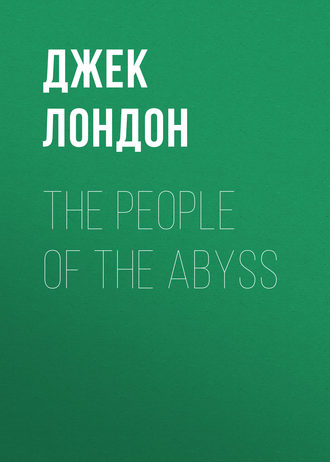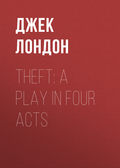
Джек Лондон
The People of the Abyss
And, finally, let me instance the case of Harriet A. Walker, a young girl of seventeen, killed while leading a forlorn hope on the industrial battlefield. She was employed as an enamelled ware brusher, wherein lead poisoning is encountered. Her father and brother were both out of employment. She concealed her illness, walked six miles a day to and from work, earned her seven or eight shillings per week, and died, at seventeen.
Depression in trade also plays an important part in hurling the workers into the Abyss. With a week’s wages between a family and pauperism, a month’s enforced idleness means hardship and misery almost indescribable, and from the ravages of which the victims do not always recover when work is to be had again. Just now the daily papers contain the report of a meeting of the Carlisle branch of the Dockers’ Union, wherein it is stated that many of the men, for months past, have not averaged a weekly income of more than from four to five shillings. The stagnated state of the shipping industry in the port of London is held accountable for this condition of affairs.
To the young working-man or working-woman, or married couple, there is no assurance of happy or healthy middle life, nor of solvent old age. Work as they will, they cannot make their future secure. It is all a matter of chance. Everything depends upon the thing happening, the thing with which they have nothing to do. Precaution cannot fend it off, nor can wiles evade it. If they remain on the industrial battlefield they must face it and take their chance against heavy odds. Of course, if they are favourably made and are not tied by kinship duties, they may run away from the industrial battlefield. In which event the safest thing the man can do is to join the army; and for the woman, possibly, to become a Red Cross nurse or go into a nunnery. In either case they must forego home and children and all that makes life worth living and old age other than a nightmare.
CHAPTER XXII – SUICIDE
With life so precarious, and opportunity for the happiness of life so remote, it is inevitable that life shall be cheap and suicide common. So common is it, that one cannot pick up a daily paper without running across it; while an attempt-at-suicide case in a police court excites no more interest than an ordinary “drunk,” and is handled with the same rapidity and unconcern.
I remember such a case in the Thames Police Court. I pride myself that I have good eyes and ears, and a fair working knowledge of men and things; but I confess, as I stood in that court-room, that I was half bewildered by the amazing despatch with which drunks, disorderlies, vagrants, brawlers, wife-beaters, thieves, fences, gamblers, and women of the street went through the machine of justice. The dock stood in the centre of the court (where the light is best), and into it and out again stepped men, women, and children, in a stream as steady as the stream of sentences which fell from the magistrate’s lips.
I was still pondering over a consumptive “fence” who had pleaded inability to work and necessity for supporting wife and children, and who had received a year at hard labour, when a young boy of about twenty appeared in the dock. “Alfred Freeman,” I caught his name, but failed to catch the charge. A stout and motherly-looking woman bobbed up in the witness-box and began her testimony. Wife of the Britannia lock-keeper, I learned she was. Time, night; a splash; she ran to the lock and found the prisoner in the water.
I flashed my gaze from her to him. So that was the charge, self-murder. He stood there dazed and unheeding, his bonny brown hair rumpled down his forehead, his face haggard and careworn and boyish still.
“Yes, sir,” the lock-keeper’s wife was saying. “As fast as I pulled to get ’im out, ’e crawled back. Then I called for ’elp, and some workmen ’appened along, and we got ’im out and turned ’im over to the constable.”
The magistrate complimented the woman on her muscular powers, and the court-room laughed; but all I could see was a boy on the threshold of life, passionately crawling to muddy death, and there was no laughter in it.
A man was now in the witness-box, testifying to the boy’s good character and giving extenuating evidence. He was the boy’s foreman, or had been. Alfred was a good boy, but he had had lots of trouble at home, money matters. And then his mother was sick. He was given to worrying, and he worried over it till he laid himself out and wasn’t fit for work. He (the foreman), for the sake of his own reputation, the boy’s work being bad, had been forced to ask him to resign.
“Anything to say?” the magistrate demanded abruptly.
The boy in the dock mumbled something indistinctly. He was still dazed.
“What does he say, constable?” the magistrate asked impatiently.
The stalwart man in blue bent his ear to the prisoner’s lips, and then replied loudly, “He says he’s very sorry, your Worship.”
“Remanded,” said his Worship; and the next case was under way, the first witness already engaged in taking the oath. The boy, dazed and unheeding, passed out with the jailer. That was all, five minutes from start to finish; and two hulking brutes in the dock were trying strenuously to shift the responsibility of the possession of a stolen fishing-pole, worth probably ten cents.
The chief trouble with these poor folk is that they do not know how to commit suicide, and usually have to make two or three attempts before they succeed. This, very naturally, is a horrid nuisance to the constables and magistrates, and gives them no end of trouble. Sometimes, however, the magistrates are frankly outspoken about the matter, and censure the prisoners for the slackness of their attempts. For instance Mr. R. S-, chairman of the S- B- magistrates, in the case the other day of Ann Wood, who tried to make away with herself in the canal: “If you wanted to do it, why didn’t you do it and get it done with?” demanded the indignant Mr. R. S-. “Why did you not get under the water and make an end of it, instead of giving us all this trouble and bother?”
Poverty, misery, and fear of the workhouse, are the principal causes of suicide among the working classes. “I’ll drown myself before I go into the workhouse,” said Ellen Hughes Hunt, aged fifty-two. Last Wednesday they held an inquest on her body at Shoreditch. Her husband came from the Islington Workhouse to testify. He had been a cheesemonger, but failure in business and poverty had driven him into the workhouse, whither his wife had refused to accompany him.
She was last seen at one in the morning. Three hours later her hat and jacket were found on the towing path by the Regent’s Canal, and later her body was fished from the water. Verdict: Suicide during temporary insanity.
Such verdicts are crimes against truth. The Law is a lie, and through it men lie most shamelessly. For instance, a disgraced woman, forsaken and spat upon by kith and kin, doses herself and her baby with laudanum. The baby dies; but she pulls through after a few weeks in hospital, is charged with murder, convicted, and sentenced to ten years’ penal servitude. Recovering, the Law holds her responsible for her actions; yet, had she died, the same Law would have rendered a verdict of temporary insanity.
Now, considering the case of Ellen Hughes Hunt, it is as fair and logical to say that her husband was suffering from temporary insanity when he went into the Islington Workhouse, as it is to say that she was suffering from temporary insanity when she went into the Regent’s Canal. As to which is the preferable sojourning place is a matter of opinion, of intellectual judgment. I, for one, from what I know of canals and workhouses, should choose the canal, were I in a similar position. And I make bold to contend that I am no more insane than Ellen Hughes Hunt, her husband, and the rest of the human herd.
Man no longer follows instinct with the old natural fidelity. He has developed into a reasoning creature, and can intellectually cling to life or discard life just as life happens to promise great pleasure or pain. I dare to assert that Ellen Hughes Hunt, defrauded and bilked of all the joys of life which fifty-two years’ service in the world has earned, with nothing but the horrors of the workhouse before her, was very rational and level-headed when she elected to jump into the canal. And I dare to assert, further, that the jury had done a wiser thing to bring in a verdict charging society with temporary insanity for allowing Ellen Hughes Hunt to be defrauded and bilked of all the joys of life which fifty-two years’ service in the world had earned.
Temporary insanity! Oh, these cursed phrases, these lies of language, under which people with meat in their bellies and whole shirts on their backs shelter themselves, and evade the responsibility of their brothers and sisters, empty of belly and without whole shirts on their backs.
From one issue of the Observer, an East End paper, I quote the following commonplace events: -
A ship’s fireman, named Johnny King, was charged with attempting to commit suicide. On Wednesday defendant went to Bow Police Station and stated that he had swallowed a quantity of phosphor paste, as he was hard up and unable to obtain work. King was taken inside and an emetic administered, when he vomited up a quantity of the poison. Defendant now said he was very sorry. Although he had sixteen years’ good character, he was unable to obtain work of any kind. Mr. Dickinson had defendant put back for the court missionary to see him.
Timothy Warner, thirty-two, was remanded for a similar offence. He jumped off Limehouse Pier, and when rescued, said, “I intended to do it.”
A decent-looking young woman, named Ellen Gray, was remanded on a charge of attempting to commit suicide. About half-past eight on Sunday morning Constable 834 K found defendant lying in a doorway in Benworth Street, and she was in a very drowsy condition. She was holding an empty bottle in one hand, and stated that some two or three hours previously she had swallowed a quantity of laudanum. As she was evidently very ill, the divisional surgeon was sent for, and having administered some coffee, ordered that she was to be kept awake. When defendant was charged, she stated that the reason why she attempted to take her life was she had neither home nor friends.
I do not say that all people who commit suicide are sane, no more than I say that all people who do not commit suicide are sane. Insecurity of food and shelter, by the way, is a great cause of insanity among the living. Costermongers, hawkers, and pedlars, a class of workers who live from hand to mouth more than those of any other class, form the highest percentage of those in the lunatic asylums. Among the males each year, 26.9 per 10,000 go insane, and among the women, 36.9. On the other hand, of soldiers, who are at least sure of food and shelter, 13 per 10,000 go insane; and of farmers and graziers, only 5.1. So a coster is twice as likely to lose his reason as a soldier, and five times as likely as a farmer.
Misfortune and misery are very potent in turning people’s heads, and drive one person to the lunatic asylum, and another to the morgue or the gallows. When the thing happens, and the father and husband, for all of his love for wife and children and his willingness to work, can get no work to do, it is a simple matter for his reason to totter and the light within his brain go out. And it is especially simple when it is taken into consideration that his body is ravaged by innutrition and disease, in addition to his soul being torn by the sight of his suffering wife and little ones.
“He is a good-looking man, with a mass of black hair, dark, expressive eyes, delicately chiselled nose and chin, and wavy, fair moustache.” This is the reporter’s description of Frank Cavilla as he stood in court, this dreary month of September, “dressed in a much worn grey suit, and wearing no collar.”
Frank Cavilla lived and worked as a house decorator in London. He is described as a good workman, a steady fellow, and not given to drink, while all his neighbours unite in testifying that he was a gentle and affectionate husband and father.
His wife, Hannah Cavilla, was a big, handsome, light-hearted woman. She saw to it that his children were sent neat and clean (the neighbours all remarked the fact) to the Childeric Road Board School. And so, with such a man, so blessed, working steadily and living temperately, all went well, and the goose hung high.
Then the thing happened. He worked for a Mr. Beck, builder, and lived in one of his master’s houses in Trundley Road. Mr. Beck was thrown from his trap and killed. The thing was an unruly horse, and, as I say, it happened. Cavilla had to seek fresh employment and find another house.
This occurred eighteen months ago. For eighteen months he fought the big fight. He got rooms in a little house in Batavia Road, but could not make both ends meet. Steady work could not be obtained. He struggled manfully at casual employment of all sorts, his wife and four children starving before his eyes. He starved himself, and grew weak, and fell ill. This was three months ago, and then there was absolutely no food at all. They made no complaint, spoke no word; but poor folk know. The housewives of Batavia Road sent them food, but so respectable were the Cavillas that the food was sent anonymously, mysteriously, so as not to hurt their pride.
The thing had happened. He had fought, and starved, and suffered for eighteen months. He got up one September morning, early. He opened his pocket-knife. He cut the throat of his wife, Hannah Cavilla, aged thirty-three. He cut the throat of his first-born, Frank, aged twelve. He cut the throat of his son, Walter, aged eight. He cut the throat of his daughter, Nellie, aged four. He cut the throat of his youngest-born, Ernest, aged sixteen months. Then he watched beside the dead all day until the evening, when the police came, and he told them to put a penny in the slot of the gas-meter in order that they might have light to see.
Frank Cavilla stood in court, dressed in a much worn grey suit, and wearing no collar. He was a good-looking man, with a mass of black hair, dark, expressive eyes, delicately chiselled nose and chin, and wavy, fair moustache.
CHAPTER XXIII – THE CHILDREN
“Where home is a hovel, and dull we grovel,
Forgetting the world is fair.”
There is one beautiful sight in the East End, and only one, and it is the children dancing in the street when the organ-grinder goes his round. It is fascinating to watch them, the new-born, the next generation, swaying and stepping, with pretty little mimicries and graceful inventions all their own, with muscles that move swiftly and easily, and bodies that leap airily, weaving rhythms never taught in dancing school.
I have talked with these children, here, there, and everywhere, and they struck me as being bright as other children, and in many ways even brighter. They have most active little imaginations. Their capacity for projecting themselves into the realm of romance and fantasy is remarkable. A joyous life is romping in their blood. They delight in music, and motion, and colour, and very often they betray a startling beauty of face and form under their filth and rags.
But there is a Pied Piper of London Town who steals them all away. They disappear. One never sees them again, or anything that suggests them. You may look for them in vain amongst the generation of grown-ups. Here you will find stunted forms, ugly faces, and blunt and stolid minds. Grace, beauty, imagination, all the resiliency of mind and muscle, are gone. Sometimes, however, you may see a woman, not necessarily old, but twisted and deformed out of all womanhood, bloated and drunken, lift her draggled skirts and execute a few grotesque and lumbering steps upon the pavement. It is a hint that she was once one of those children who danced to the organ-grinder. Those grotesque and lumbering steps are all that is left of the promise of childhood. In the befogged recesses of her brain has arisen a fleeting memory that she was once a girl. The crowd closes in. Little girls are dancing beside her, about her, with all the pretty graces she dimly recollects, but can no more than parody with her body. Then she pants for breath, exhausted, and stumbles out through the circle. But the little girls dance on.
The children of the Ghetto possess all the qualities which make for noble manhood and womanhood; but the Ghetto itself, like an infuriated tigress turning on its young, turns upon and destroys all these qualities, blots out the light and laughter, and moulds those it does not kill into sodden and forlorn creatures, uncouth, degraded, and wretched below the beasts of the field.
As to the manner in which this is done, I have in previous chapters described it at length; here let Professor Huxley describe it in brief: -
“Any one who is acquainted with the state of the population of all great industrial centres, whether in this or other countries, is aware that amidst a large and increasing body of that population there reigns supreme.. that condition which the French call la misère, a word for which I do not think there is any exact English equivalent. It is a condition in which the food, warmth, and clothing which are necessary for the mere maintenance of the functions of the body in their normal state cannot be obtained; in which men, women, and children are forced to crowd into dens wherein decency is abolished, and the most ordinary conditions of healthful existence are impossible of attainment; in which the pleasures within reach are reduced to brutality and drunkenness; in which the pains accumulate at compound interest in the shape of starvation, disease, stunted development, and moral degradation; in which the prospect of even steady and honest industry is a life of unsuccessful battling with hunger, rounded by a pauper’s grave.”
In such conditions, the outlook for children is hopeless. They die like flies, and those that survive, survive because they possess excessive vitality and a capacity of adaptation to the degradation with which they are surrounded. They have no home life. In the dens and lairs in which they live they are exposed to all that is obscene and indecent. And as their minds are made rotten, so are their bodies made rotten by bad sanitation, overcrowding, and underfeeding. When a father and mother live with three or four children in a room where the children take turn about in sitting up to drive the rats away from the sleepers, when those children never have enough to eat and are preyed upon and made miserable and weak by swarming vermin, the sort of men and women the survivors will make can readily be imagined.
“Dull despair and misery
Lie about them from their birth;
Ugly curses, uglier mirth,
Are their earliest lullaby.”
A man and a woman marry and set up housekeeping in one room. Their income does not increase with the years, though their family does, and the man is exceedingly lucky if he can keep his health and his job. A baby comes, and then another. This means that more room should be obtained; but these little mouths and bodies mean additional expense and make it absolutely impossible to get more spacious quarters. More babies come. There is not room in which to turn around. The youngsters run the streets, and by the time they are twelve or fourteen the room-issue comes to a head, and out they go on the streets for good. The boy, if he be lucky, can manage to make the common lodging-houses, and he may have any one of several ends. But the girl of fourteen or fifteen, forced in this manner to leave the one room called home, and able to earn at the best a paltry five or six shillings per week, can have but one end. And the bitter end of that one end is such as that of the woman whose body the police found this morning in a doorway in Dorset Street, Whitechapel. Homeless, shelterless, sick, with no one with her in her last hour, she had died in the night of exposure. She was sixty-two years old and a match vendor. She died as a wild animal dies.
Fresh in my mind is the picture of a boy in the dock of an East End police court. His head was barely visible above the railing. He was being proved guilty of stealing two shillings from a woman, which he had spent, not for candy and cakes and a good time, but for food.
“Why didn’t you ask the woman for food?” the magistrate demanded, in a hurt sort of tone. “She would surely have given you something to eat.”
“If I ’ad arsked ’er, I’d got locked up for beggin’,” was the boy’s reply.
The magistrate knitted his brows and accepted the rebuke. Nobody knew the boy, nor his father or mother. He was without beginning or antecedent, a waif, a stray, a young cub seeking his food in the jungle of empire, preying upon the weak and being preyed upon by the strong.
The people who try to help, who gather up the Ghetto children and send them away on a day’s outing to the country, believe that not very many children reach the age of ten without having had at least one day there. Of this, a writer says: “The mental change caused by one day so spent must not be undervalued. Whatever the circumstances, the children learn the meaning of fields and woods, so that descriptions of country scenery in the books they read, which before conveyed no impression, become now intelligible.”
One day in the fields and woods, if they are lucky enough to be picked up by the people who try to help! And they are being born faster every day than they can be carted off to the fields and woods for the one day in their lives. One day! In all their lives, one day! And for the rest of the days, as the boy told a certain bishop, “At ten we ’ops the wag; at thirteen we nicks things; an’ at sixteen we bashes the copper.” Which is to say, at ten they play truant, at thirteen steal, and at sixteen are sufficiently developed hooligans to smash the policemen.
The Rev. J. Cartmel Robinson tells of a boy and girl of his parish who set out to walk to the forest. They walked and walked through the never-ending streets, expecting always to see it by-and-by; until they sat down at last, faint and despairing, and were rescued by a kind woman who brought them back. Evidently they had been overlooked by the people who try to help.
The same gentleman is authority for the statement that in a street in Hoxton (a district of the vast East End), over seven hundred children, between five and thirteen years, live in eighty small houses. And he adds: “It is because London has largely shut her children in a maze of streets and houses and robbed them of their rightful inheritance in sky and field and brook, that they grow up to be men and women physically unfit.”
He tells of a member of his congregation who let a basement room to a married couple. “They said they had two children; when they got possession it turned out that they had four. After a while a fifth appeared, and the landlord gave them notice to quit. They paid no attention to it. Then the sanitary inspector who has to wink at the law so often, came in and threatened my friend with legal proceedings. He pleaded that he could not get them out. They pleaded that nobody would have them with so many children at a rental within their means, which is one of the commonest complaints of the poor, by-the-bye. What was to be done? The landlord was between two millstones. Finally he applied to the magistrate, who sent up an officer to inquire into the case. Since that time about twenty days have elapsed, and nothing has yet been done. Is this a singular case? By no means; it is quite common.”
Last week the police raided a disorderly house. In one room were found two young children. They were arrested and charged with being inmates the same as the women had been. Their father appeared at the trial. He stated that himself and wife and two older children, besides the two in the dock, occupied that room; he stated also that he occupied it because he could get no other room for the half-crown a week he paid for it. The magistrate discharged the two juvenile offenders and warned the father that he was bringing his children up unhealthily.
But there is no need further to multiply instances. In London the slaughter of the innocents goes on on a scale more stupendous than any before in the history of the world. And equally stupendous is the callousness of the people who believe in Christ, acknowledge God, and go to church regularly on Sunday. For the rest of the week they riot about on the rents and profits which come to them from the East End stained with the blood of the children. Also, at times, so peculiarly are they made, they will take half a million of these rents and profits and send it away to educate the black boys of the Soudan.






